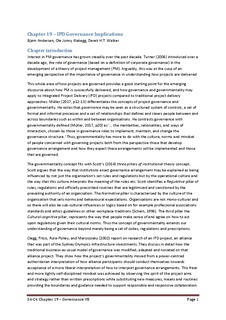| dc.contributor.author | Andersen, Bjørn Sørskot | |
| dc.contributor.author | Klakegg, Ole Jonny | |
| dc.contributor.author | Walker, Derek H.T. | |
| dc.date.accessioned | 2019-09-17T06:58:31Z | |
| dc.date.available | 2019-09-17T06:58:31Z | |
| dc.date.created | 2019-08-12T08:51:47Z | |
| dc.date.issued | 2019 | |
| dc.identifier.isbn | 9781138736689 | |
| dc.identifier.uri | http://hdl.handle.net/11250/2617093 | |
| dc.description.abstract | Interest in project-management (PM) governance has grown steadily over the past decade. Turner (2006) introduced, over a decade ago, the role of governance (based on a definition of corporate governance) in the development of a theory of PM governance. Arguably, this was at the cusp of an emerging perspective of the importance of governance in understanding how projects are delivered. | nb_NO |
| dc.language.iso | eng | nb_NO |
| dc.publisher | Routledge | nb_NO |
| dc.relation.ispartof | Routledge Handbook of Integrated Project Delivery | |
| dc.title | IPD governance implications | nb_NO |
| dc.type | Chapter | nb_NO |
| dc.description.version | acceptedVersion | nb_NO |
| dc.source.pagenumber | 417-438 | nb_NO |
| dc.identifier.cristin | 1715205 | |
| dc.description.localcode | Locked until 26.7.2020 due to copyright restrictions. This is an Accepted Manuscript of a book chapter published by Routledge in [Routledge Handbook of Integrated Project Delivery], available online: https://doi.org/10.1201/9781315185774 | nb_NO |
| cristin.unitcode | 194,64,91,0 | |
| cristin.unitname | Institutt for bygg- og miljøteknikk | |
| cristin.ispublished | true | |
| cristin.fulltext | preprint | |
| cristin.qualitycode | 2 | |
